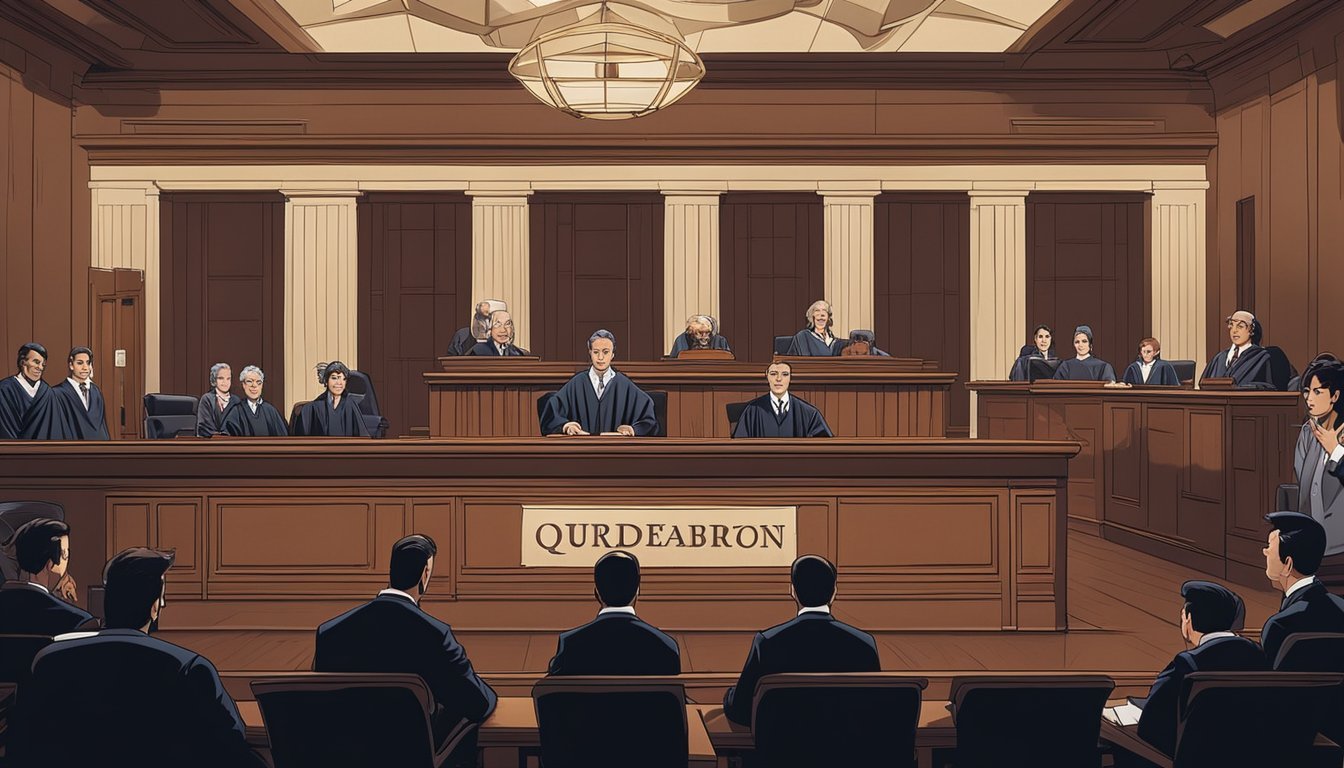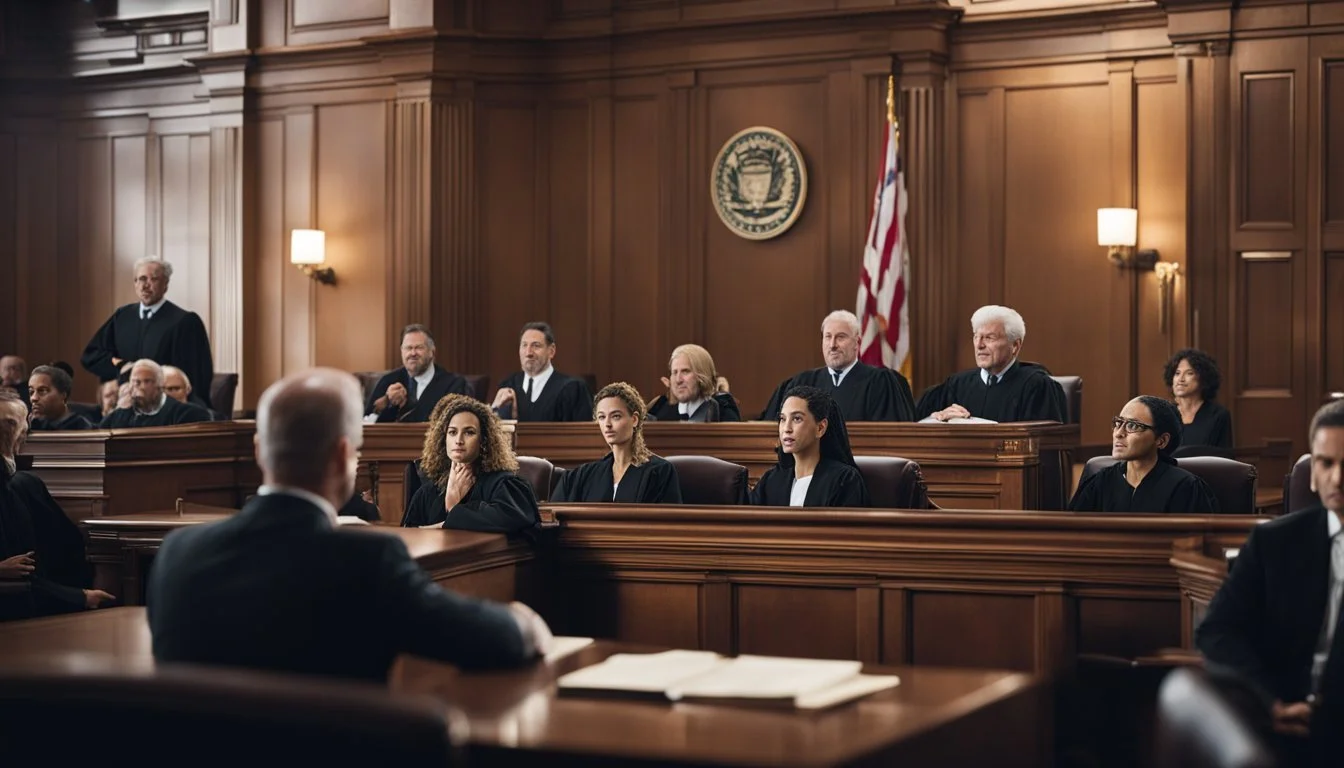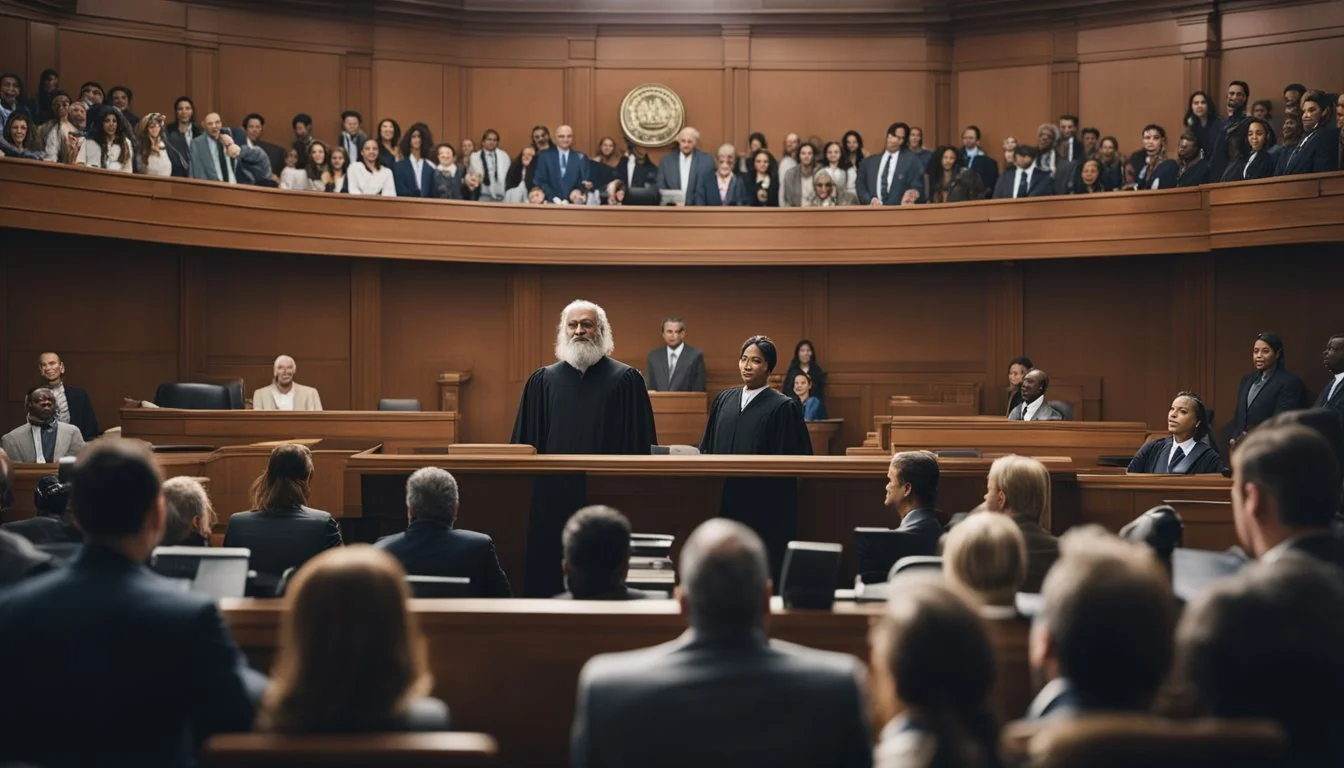6 Riveting Films About Political Trials
Compelling Courtroom Dramas to Watch
Political trials, where legal proceedings intersect with governmental affairs and societal values, have long intrigued filmmakers. These trials often explore themes of justice, power, and civil liberties, providing not just drama but also insightful commentary on the political climates they represent.
What makes films about political trials gripping is their ability to reflect real-world conflicts and moral dilemmas, making them both educational and engaging for audiences. These movies serve as a lens through which viewers can examine the complexities of governance, the rule of law, and individual rights in times of political strife.
1) Judgment at Nuremberg (1961)
"Judgment at Nuremberg" is a 1961 American legal drama film directed by Stanley Kramer. It features an ensemble cast including Spencer Tracy, Burt Lancaster, Richard Widmark, and Marlene Dietrich. The film provides a dramatized portrayal of the Nuremberg Trials, where Nazi officials were prosecuted for war crimes following World War II.
Set in Nuremberg, West Germany, the story focuses on an American court trying four Nazis. The film examines the moral dilemmas and legal precedents established during these historic trials. Key performances, especially by Maximilian Schell, add depth to its exploration of justice and complicity.
The screenplay by Abby Mann delves into the complexities of post-war justice, reflecting the tension between retribution and reconciliation. The black-and-white cinematography complements the gravity of the subject matter, emphasizing the bleak and austere backdrop against which the trials took place.
"Judgment at Nuremberg" stands out for its intense courtroom scenes and thought-provoking dialogue. It has been lauded for its meticulous attention to historical details and its gripping narrative.
For more information on "Judgment at Nuremberg," visit IMDb or Wikipedia.
2) The Trial of the Chicago 7 (2020)
"The Trial of the Chicago 7" (2020) is a historical legal drama directed and written by Aaron Sorkin. The film depicts the infamous trial of seven anti-Vietnam War protesters charged with conspiracy and incitement to riot during the 1968 Democratic National Convention in Chicago.
The narrative draws from actual court transcripts, featuring an ensemble cast including Yahya Abdul-Mateen II, Sacha Baron Cohen, and Eddie Redmayne. These actors bring to life the tension and political undercurrents of a highly polarized era in American history.
Flashbacks to the chaotic protests provide context to the courtroom drama, showcasing the turbulent social climate of the late 1960s. The film captures the clash between protestors and authorities, highlighting issues of justice, civil rights, and governmental power.
Aaron Sorkin's script is known for its sharp dialogue and intense drama, which keeps viewers engaged. The real-life events are given a cinematic treatment that emphasizes both the gravity and the absurdities of the trial.
For more information on "The Trial of the Chicago 7," visit Wikipedia.
3) A Few Good Men (1992)
"A Few Good Men" (1992) is a standout legal drama directed by Rob Reiner and based on Aaron Sorkin's play. The film stars Tom Cruise, Jack Nicholson, and Demi Moore, among other notable actors.
The plot follows military lawyer Lieutenant Daniel Kaffee, played by Tom Cruise, who defends two Marines accused of murder. These Marines contend they were acting under orders, which introduces a complex web of ethical and legal implications.
Jack Nicholson delivers a powerful performance as Colonel Nathan R. Jessup, infamously known for the line, "You can't handle the truth!" This courtroom scene remains one of the most memorable moments in film history.
The narrative expertly navigates themes of authority, morality, and justice through sharp dialogue and strong performances. The movie's compelling storyline and tension-filled courtroom scenes ensure it remains a relevant and thought-provoking piece.
For more information, you can visit the Wikipedia page.
4) Inherit the Wind (1960)
"Inherit the Wind" is a classic American drama film directed by Stanley Kramer. Released in 1960, it draws inspiration from the 1925 Scopes "Monkey" Trial. The trial was a significant event where John T. Scopes, a high school teacher, faced charges for teaching Charles Darwin's theory of evolution. This courtroom drama delves into themes of science versus religion and freedom of thought.
The film features a stellar cast, with Spencer Tracy and Fredric March delivering powerful performances as the opposing lawyers, Henry Drummond and Matthew Harrison Brady. Gene Kelly also plays a notable role as a cynical reporter.
Stanley Kramer's direction ensures that the tension and drama of the courtroom are palpable. His approach brings out the intense ideological conflict between the characters, making the audience reflect on broader societal issues.
For more information on "Inherit the Wind," visit IMDb.
5) To Kill a Mockingbird (1962)
"To Kill a Mockingbird," directed by Robert Mulligan, is a 1962 film that depicts a poignant political trial rooted in racial injustice. It brings Harper Lee's celebrated novel to life, presenting a compelling narrative about justice and morality in Depression-era Alabama.
Gregory Peck stars as Atticus Finch, a principled lawyer who defends a Black man, Tom Robinson, falsely accused of raping a white woman. Peck's portrayal of Finch earned him an Academy Award for Best Actor, and the film itself won three Oscars out of eight nominations.
The courtroom scenes are intense and powerful, showcasing the deep-seated prejudices of the time. The film does an excellent job highlighting the racial tensions and the flawed legal system. This authenticity makes it a critical piece of American cinema.
Additionally, "To Kill a Mockingbird" marked the film debut of Robert Duvall as Boo Radley. The film remains relevant in its themes of racial injustice and moral integrity, making it a timeless classic. It is often used in educational settings to discuss these important issues.
For more information, visit the Wikipedia page.
6) The People vs. Larry Flynt (1996)
Directed by Miloš Forman, "The People vs. Larry Flynt" chronicles the controversial life of Larry Flynt, the founder of Hustler magazine. Woody Harrelson stars as Flynt, delivering a notable performance that captures Flynt's bold and rebellious nature.
Courtney Love plays Althea, Flynt's wife, bringing both vulnerability and raw energy to the role. Edward Norton stars as Alan Isaacman, Flynt's attorney, who becomes central to the film's exploration of free speech and the First Amendment.
The film delves into Flynt's numerous legal battles, notably against religious institutions and the U.S. government. Its narrative highlights Flynt's relentless fight to maintain his provocative publication while challenging the boundaries of free speech.
With its sharp direction, engaging performances, and thought-provoking subject matter, "The People vs. Larry Flynt" is both an entertaining biopic and a significant commentary on civil liberties.
For more information, visit The People vs. Larry Flynt on IMDb.
Importance Of Political Trials
Political trials have shaped historical narratives, impacted societal norms, and set legal precedents that influence contemporary judicial systems. These trials often highlight tensions between governmental authority and individual rights.
Historical Significance
Political trials play a crucial role in documenting and reflecting on pivotal moments in history. They often mark a shift in political landscapes, as seen in trials like those of Nelson Mandela during apartheid in South Africa or the Nuremberg Trials post-World War II. These trials provide insight into the political climate of their times and offer a window into how justice is administered under varying regimes. Additionally, they serve as historical records, preserving testimonies and evidence that might otherwise be lost to time.
Impact On Society
The societal impact of political trials cannot be understated. They have the power to mobilize public opinion, influence political movements, and even lead to significant legislative changes. For instance, the trial of whistleblower Daniel Ellsberg in the 1970s played a pivotal role in shaping public discourse on government transparency. Such trials often highlight societal values and injustices, prompting dialogue and sometimes sparking reforms. They also offer a platform for marginalized voices, helping to bring issues like civil rights and political repression to the forefront of public consciousness.
Legal Precedents
Political trials set crucial legal precedents that shape future judicial decisions. They often test the boundaries of legal principles and civil liberties, leading to landmark rulings. For example, the trial of Alger Hiss during the early Cold War era influenced policies around espionage and national security. These precedents can redefine legal interpretations and practices, ensuring that the law evolves with changing societal norms. Furthermore, they often lead to the development of new laws or the refinement of existing ones, which helps in maintaining a dynamic and responsive legal system.
Analyzing Storytelling Techniques
When exploring the narratives of political trials in film, two critical elements often stand out: the narrative structure and the character development. These components work together to engage the audience and convey the complexities of political and judicial processes.
Narrative Structure
The narrative structure in films about political trials often follows a three-act format. The first act sets up the political context and introduces the principal conflict. The inciting incident usually involves a significant legal or political event that propels the protagonist into the trial.
In the second act, the tension escalates as the political stakes increase. Films like A Few Good Men skillfully use tension and drama to maintain audience interest. This act often culminates in a pivotal courtroom scene that serves as the climax.
The third act resolves the trial and reflects on the political implications. The resolution may leave the audience contemplating the broader societal impacts, often through a combination of courtroom verdicts and post-trial consequences. This structure ensures a compelling and coherent narrative.
Character Development
In political trial films, character development is essential for creating relatable and memorable characters. Protagonists are often portrayed as underdog figures facing immense pressure, as seen in movies like The Trial of the Chicago 7. They undergo significant transformations reflecting their personal stakes in the trial.
Antagonists are typically depicted with complex motives, adding depth to the political narrative. Secondary characters, such as witnesses and lawyers, are fleshed out to highlight various viewpoints and biases.
The personal backgrounds and relationships of the characters are explored to provide context to their actions and loyalties. This nuanced development helps the audience connect with the characters emotionally, making the political commentary more impactful.



